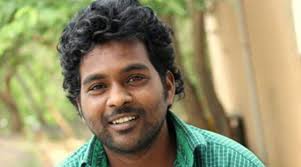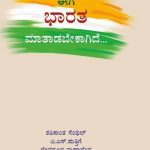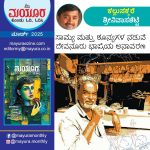Wish he had gained a new lease on life–Devanoora Mahadeva
[English translation of Devanur Mahadeva’s words about Rohit Vemula “Matte maru huttu padeyabekagittu” by Prof. H. S. Komalesh. ರೋಹಿತ್ ವೇಮುಲನ ಕುರಿತು ದೇವನೂರ ಮಹಾದೇವ ಅವರ ಒಡಲಾಳದ ಮಾತು ”ಮತ್ತೆ ಮರುಹುಟ್ಟು ಪಡೆಯಬೇಕಾಗಿತ್ತು” ಬರಹದ ಇಂಗ್ಲಿಷ್ ಅನುವಾದ ಪ್ರೊ.ಹೆಚ್.ಎಸ್.ಕೋಮಲೇಶ್ ಅವರಿಂದ.]
Whenever I sit to write a short note on Rohith Vemula, mixed-up images of his bright face and of his death note appear before my eyes; and I grope for words to describe the feeling.
…the death-note that he wrote during the last moments of his life, whom did he write it to? If you read it, you’d think he is addressing the earth. He is dead and he says no one is responsible for his death. What does it suggest? Through that note, is he gently mocking the ones who are living today and are gone tomorrow? Or is he comforting them?
Rohith Vemula, who says no one is responsible for his death, wrote a letter to the Vice-Chancellor on December 18, 2015: “Please serve 10 mg of sodium azide to all Dalit students during admission. Supply a nice rope to the rooms of all Dalit students…I request your highness to make preparations for the facility ‘EUTHANASIA’ for students like me.” – His words that seem to erupt like burning lava clearly show the reasons behind his death.
Yet, what could be the consciousness of Rohith who, saying no one is responsible for his death, offered his neck to the noose? How could it have looked at the world around? Had it not realized that the world around, which is steeply absorbed in cheap divisions of castes and creeds, snares and lies consisted of nothing more than petty creatures and hapless vermin? If it had realized that, could it have come up with the line “no one is responsible for my death”? He must have found life disgusting and unbearable; did he leap to the sky to make it bearable?
Nevertheless, in the sacred parliament that governs the nation, the minister of Human Resource Development, using Rohith’s death-note as an excuse, does not only state that “Rohith has written no one was responsible for his death”, but goes on to weave a narrative of lies around the incident and diminishes the stature of the House. By doing so, she reduced the Parliament to a market place of insensitive beings; in fact, on that day she killed the sense of shame itself. Be that as it may,
After completing his higher studies abroad, Ambedkar returned to Baroda in 1917. He couldn’t find a house to rent. Finally, concealing his caste he sought lodging in a Parsi hotel. But soon when it was discovered that he was a Mahar, and he was brutally insulted and kicked out of the hotel. Recollecting those testing times, Ambedkar wrote later: ‘at that moment, I felt totally empty’. Even Vemula has written in his death-note: “…at this moment…I am just empty.” At the hour of such humiliation and devastated condition, somehow Ambedkar gathers himself, sails through and indeed gains a new lease on life. Mustering his strength, he drinks the poison, sustains it and becomes like a Vishakanta. Unfortunately, Vemula, who didn’t even have to experience one tenth of humiliation that Ambedkar had to in his life, the Vemula who could have become a beacon of light for his community, should have found, like Ambedkar, a fresh lease on life to brace through. He really should have found it, I say to myself whenever his face comes before my eyes.
[Translated by Prof. H.S.Komalesh]








